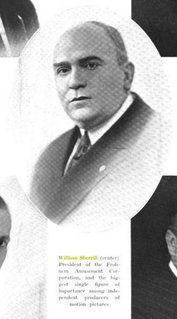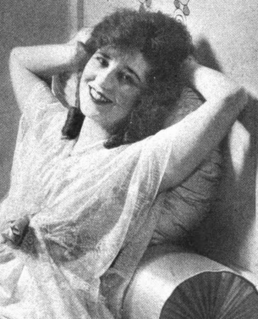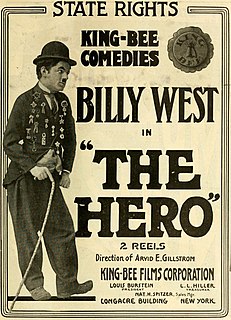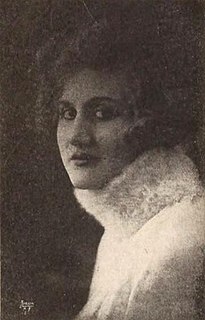Related Research Articles

Screen Gems is a brand name used by Sony Pictures' Sony Pictures Entertainment Motion Picture Group, a subsidiary of Japanese multinational conglomerate, Sony Group Corporation. It has served several different purposes for its parent companies over the decades since its incorporation, initially as a cartoon studio, then a television studio, and later on as a film studio.

Ynez Seabury was an American actress of the stage, silent and early sound film era. She began her career as a child actor, making her screen debut in D. W. Griffith's The Miser's Heart (1911). She went on to appear on Broadway, and continued to occasionally appear in films during the early sound era. Her last credited feature film appearance was in Cecil B. DeMille's North West Mounted Police (1940).

James A. Marcus was an American actor. He appeared in more than 100 films between 1915 and 1937. He was born in New York City. On October 15, 1937, Marcus died in Hollywood, California from a heart attack at age 70. Marcus' most notable films include Regeneration, Oliver Twist and Sadie Thompson.

Tiffany Pictures, which also became Tiffany-Stahl Productions for a time, was a Hollywood motion picture studio in operation from 1921 until 1932. It is considered a Poverty Row studio, whose films had lower budgets, lesser-known stars, and overall lower production values than major studios.
Milt Goldstein or "Milton Goldstein" is an American executive in the Motion Picture Industry.

Everett Russell "Shorty" Cowell was an American football and basketball coach. He served as the football coach at Sterling College in Sterling, Kansas from 1926 to 1927, compiling a record of 8–8. Cowell was also the head basketball coach at Ottawa University in Ottawa, Kansas from 1923 to 1925, tallying a mark of 16–20. He attended Kansas State Agricultural College—now known as Kansas State University—where lettered in football, basketball, and baseball.

Samuel J. Briskin was one of the foremost producers of Hollywood's Golden Age, who was the head of production during his career of 3 of the "Big 8" major film studios of its Golden Age: Columbia Pictures (twice), Paramount Pictures, and RKO Pictures. In the late 1950s he would also serve briefly on the board of directors of another major, Metro-Goldwyn-Mayer. During World War II, Briskin served in the army's Signal Corps as a film producer, attaining the rank of lieutenant colonel. After the war he co-founded Liberty Films with Frank Capra. They were later joined by William Wyler and George Stevens. The studio only produced two films, but both are now considered classics: It's a Wonderful Life and State of the Union. All three of his brothers were also film producers, as well as one of his sons, and his sister was married to the eventual Chairman of Columbia, where Briskin spent the last decade of his life as a vice-president and head of production until his death in 1968 from a heart attack.
Lee Marcus, also known as Lee S. Marcus, was an American film producer of the 1930s and 1940s. During his fifteen-year career he produced over 85 films, most of them between 1934 and 1941 while he was at RKO Studios. Prior to his production career, Marcus worked for FBO and then RKO as a sales executive, reaching the level of vice president in both organizations. At RKO, he was head of production of the studio's b-films during the late 1930s and the beginning of the 1940s. He was also responsible for producing what many consider to be the first film noir, 1940's Stranger on the Third Floor.

Margaret Victoria Anderson known professionally as Myrtle Lind was an American film actress. She was one of Mack Sennett's Bathing Beauties and appeared in several comedy films including with Oliver Hardy and John Gilbert. The Library of Congress has a photo of her holding a large camera on the beach.

William L. Sherill was a producer in the early film industry of the United States. He served as president of the Frohman Amusement Company. A 1918 issue of Theatre Magazine reported he was the single most important figure among independent producers of motion pictures.
Albert Sidney Angeles was a theatre actor and director of silent films. Born in London, he worked in the USA as a writer and director for Vitagraph, later directing for Universal.

Mabel Withee was an American actress on stage and in silent film.
Percy Challenger was a film and theater actor in the United States. He appeared in dozens of films.

Armand Cortes, sometimes credited as Armand Cortez, was an actor in theater and film in the United States. He had various theatrical roles in the late 1920s and early 1930s.
Al Rockett, born Albert L. Rockett, was a movie producer. His 1924 film Abraham Lincoln, produced with his brother Ray Rockett, was a major production. It won the Photoplay Medal of Honor for 1924 from Photoplay Magazine, the most prestigious American film award of the time. He was born in Vincennes, Indiana, and played piano in a nickelodeon theater for five years. He worked for First National Pictures and Fox Film Corporation.

King-Bee Films Corporation was a film production company in the U.S. that released two-real short film comedies during the silent film era. The company's stars included Billy West, a Charlie Chaplin imitator. Louis Burstein was the company's president and general manager. He established it in 1917 after the breakup of Vim Comedy Company to produce comedies starring West. Oliver Hardy and Ethelyn Gibson also acted for the company. It operated a studio in Jacksonville, Florida, then Bayonne, New Jersey and finally at 1329 Gordon Street in Hollywood, California. Its offices were in New York.

Ethelyn Gibson (1897–1972), sometimes credited as Ethlyn Gibson, was an American stage and screen actress who featured in films and productions in the 1910s and 1920s. First joining the theatre through becoming a member of The Charlie Chaplin Revue in 1911, she then became involved in other revue productions as a member of the Ziegfeld Follies. She joined the silent-film industry beginning in 1917, appearing with Oliver Hardy before acting as a leading lady in multiple Billy West films. Later, she also appeared in works with Charley Chase. One of her most famous roles was acting as the title character in the Winnie Winkle series of films from 1926 to 1928.

Irving Briskin was an American film producer of more than 200 films during the 1930s and 1940s. He was the brother of Samuel J. Briskin and Murray Briskin, both also film producers.
Author's Film Company was a film company in New York City from 1915 until 1918. An adaptation of Walt Mason's poem "The Dipper" was filmed in North Carolina. Addison J. Rothermel directed. In 1916, the firm released an Italian film retitled as Her Redemption about the sinking of the Lusitania. Plimpton Epic Film Company released through Author's Film Company.
Fields of Honor is a 1918 five-part film adapted from a story by Irvin S. Cobb. Ralph Ince directed. Advertising for the film described it as a dramatic portrayal of what women are sacrificing to the world war. It was produced by Samuel Goldwyn. It is not held at the Library of Congress.
References
- ↑ Quigley, Martin; Monush, Barry (January 1, 1995). First Century of Film. Quigley Publishing. ISBN 9780900610547 – via page 120.
- ↑ "Motography". October 6, 1918 – via Google Books.
- ↑ "Sterling Eliminates Foreign Broker System". The Film Daily. July 10, 1927. p. 4. Retrieved September 7, 2020.

- ↑ "Briskin Goes to Montreal". The Film Daily. July 21, 1927. p. 6. Retrieved September 7, 2020.

- ↑ "Irving J. Briskin Named Vice President". The Film Daily. August 24, 1928. p. 4. Retrieved September 7, 2020.

- ↑ "Dramatic Mirror of Motion Pictures and the Stage". Dramatic Mirror Company. October 6, 1918 – via Google Books.
- ↑ Jacobs, Lea (April 2, 2008). The Decline of Sentiment: American Film in the 1920s. University of California Press. ISBN 9780520237018 – via Google Books.
- ↑ Korst, Lindsay (January 3, 2016). "Red Signals 1927".
- ↑ Massa, Steve (April 6, 2013). "Lame Brains and Lunatics". BearManor Media – via Google Books.